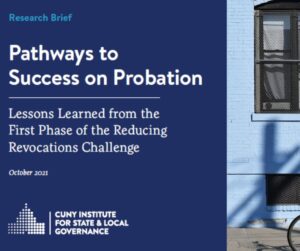 Probation was designed to be an alternative to incarceration, yet for many people under supervision it turns out be a pathway that inevitably leads them there. Nationwide, one in 57 people—nearly 2% of the adult population—is under supervision. Despite this, we know very little about how to effectively manage and support people on probation in a manner that reduces revocations, maximizes success, and works to achieve community safety and well-being. We also know very little about how to respond to people on supervision in ways that prevent new criminal activity without over-punishing less harmful behaviors or exacerbating racial and ethnic disparities. This knowledge gap has, instead of keeping people out of jail and prison, made supervision into one of the biggest drivers of prison admissions in the United States; probation revocations alone are responsible for nearly one in four prison admissions.
Probation was designed to be an alternative to incarceration, yet for many people under supervision it turns out be a pathway that inevitably leads them there. Nationwide, one in 57 people—nearly 2% of the adult population—is under supervision. Despite this, we know very little about how to effectively manage and support people on probation in a manner that reduces revocations, maximizes success, and works to achieve community safety and well-being. We also know very little about how to respond to people on supervision in ways that prevent new criminal activity without over-punishing less harmful behaviors or exacerbating racial and ethnic disparities. This knowledge gap has, instead of keeping people out of jail and prison, made supervision into one of the biggest drivers of prison admissions in the United States; probation revocations alone are responsible for nearly one in four prison admissions.
With this in mind, the CUNY Institute for State and Local Governance launched the Reducing Revocations Challenge, a national initiative supported by Arnold Ventures that funded action research teams pairing probation departments in 10 jurisdictions with research organizations to explore in-depth the drivers of probation violations and revocations and use that information to identify new policy and practice solutions. The findings from this phase are detailed in Pathways to Success on Probation, a research brief highlighting new insights regarding the prevalence of technical violations, the role of new criminal activity in driving revocations, and the relationship of assessed risk level to the likelihood of a probation officer filing a violation; as well as reaffirming existing knowledge. In the next phase of the Challenge, a subset of these sites will receive additional funds and other support to implement the strategies developed as the result of this research.
